Individual Reflection Report: Airdri Ltd Marketing Team
VerifiedAdded on 2023/01/09
|11
|1768
|59
Report
AI Summary
This individual reflection report analyzes the experience of working in a marketing team at Airdri Limited, focusing on teamwork dynamics and personal development. The report begins with an executive summary and introduction, followed by a literature review of team theories, including Belbin's team roles and Tuckman's stages of team development. The main body applies these theories to the student's experience within the marketing team, evaluating the application of different team roles and the stages of team development. It uses Gibb's reflection model to analyze the team's performance, including descriptions, feelings, evaluations, and analysis of the experience. The report concludes with reflections on the experience, lessons learned, and a personal and professional development plan, specifically focusing on improving negotiation and analytical skills. The student faced challenges related to miscommunication and a lack of analytical skills. The report also includes appendices that include the personal and professional development plan and the Gibb's reflection model.
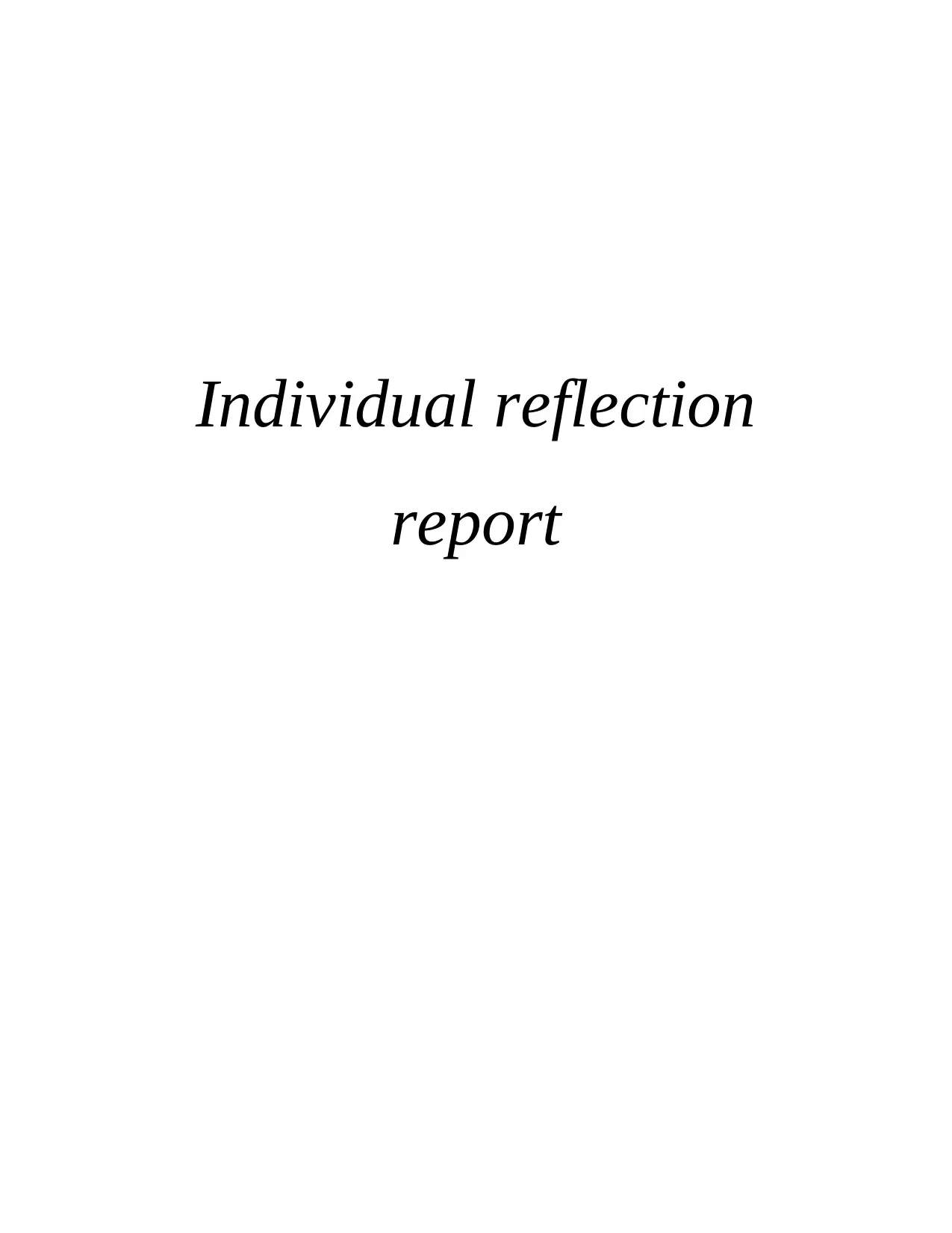
Individual reflection
report
report
Paraphrase This Document
Need a fresh take? Get an instant paraphrase of this document with our AI Paraphraser
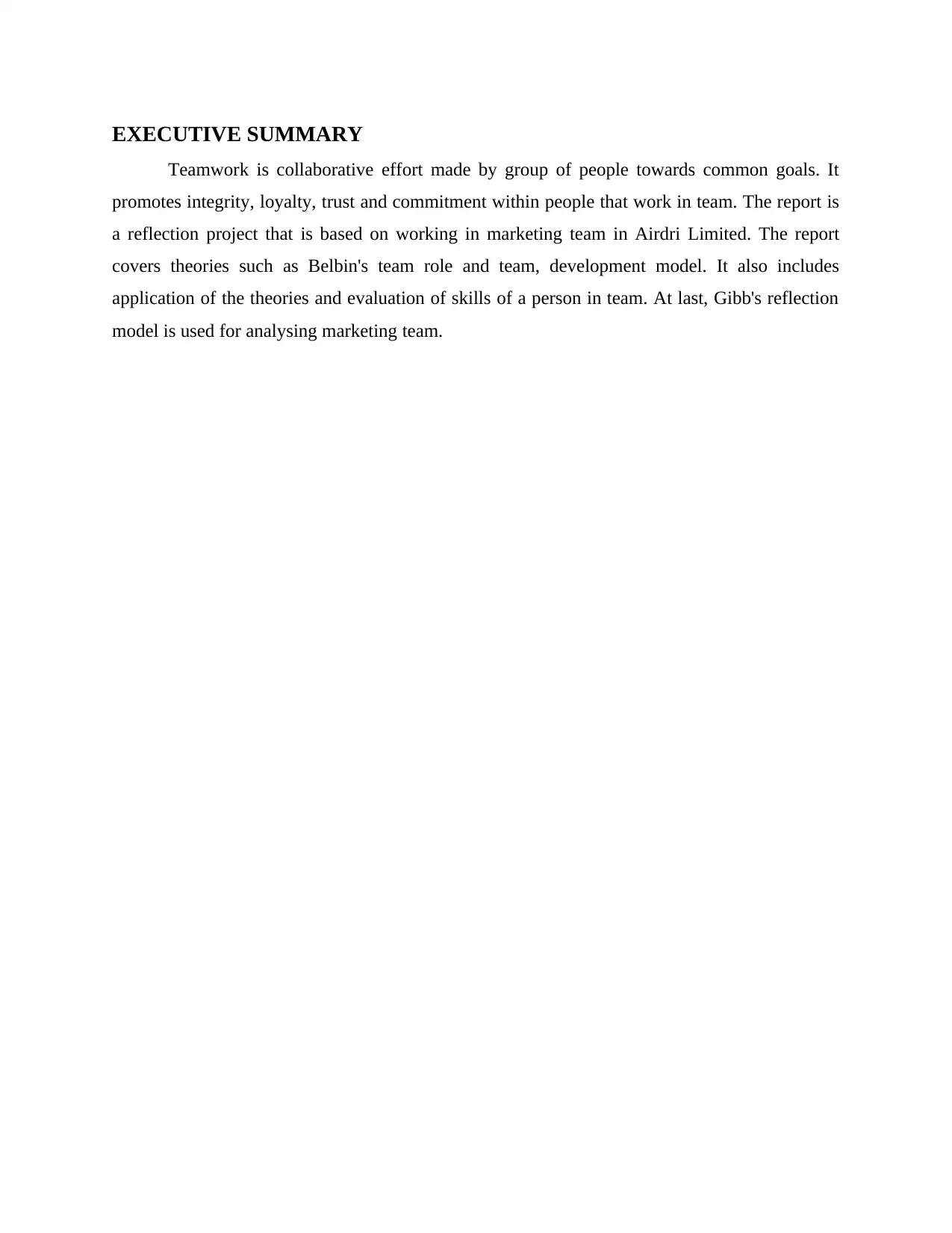
EXECUTIVE SUMMARY
Teamwork is collaborative effort made by group of people towards common goals. It
promotes integrity, loyalty, trust and commitment within people that work in team. The report is
a reflection project that is based on working in marketing team in Airdri Limited. The report
covers theories such as Belbin's team role and team, development model. It also includes
application of the theories and evaluation of skills of a person in team. At last, Gibb's reflection
model is used for analysing marketing team.
Teamwork is collaborative effort made by group of people towards common goals. It
promotes integrity, loyalty, trust and commitment within people that work in team. The report is
a reflection project that is based on working in marketing team in Airdri Limited. The report
covers theories such as Belbin's team role and team, development model. It also includes
application of the theories and evaluation of skills of a person in team. At last, Gibb's reflection
model is used for analysing marketing team.
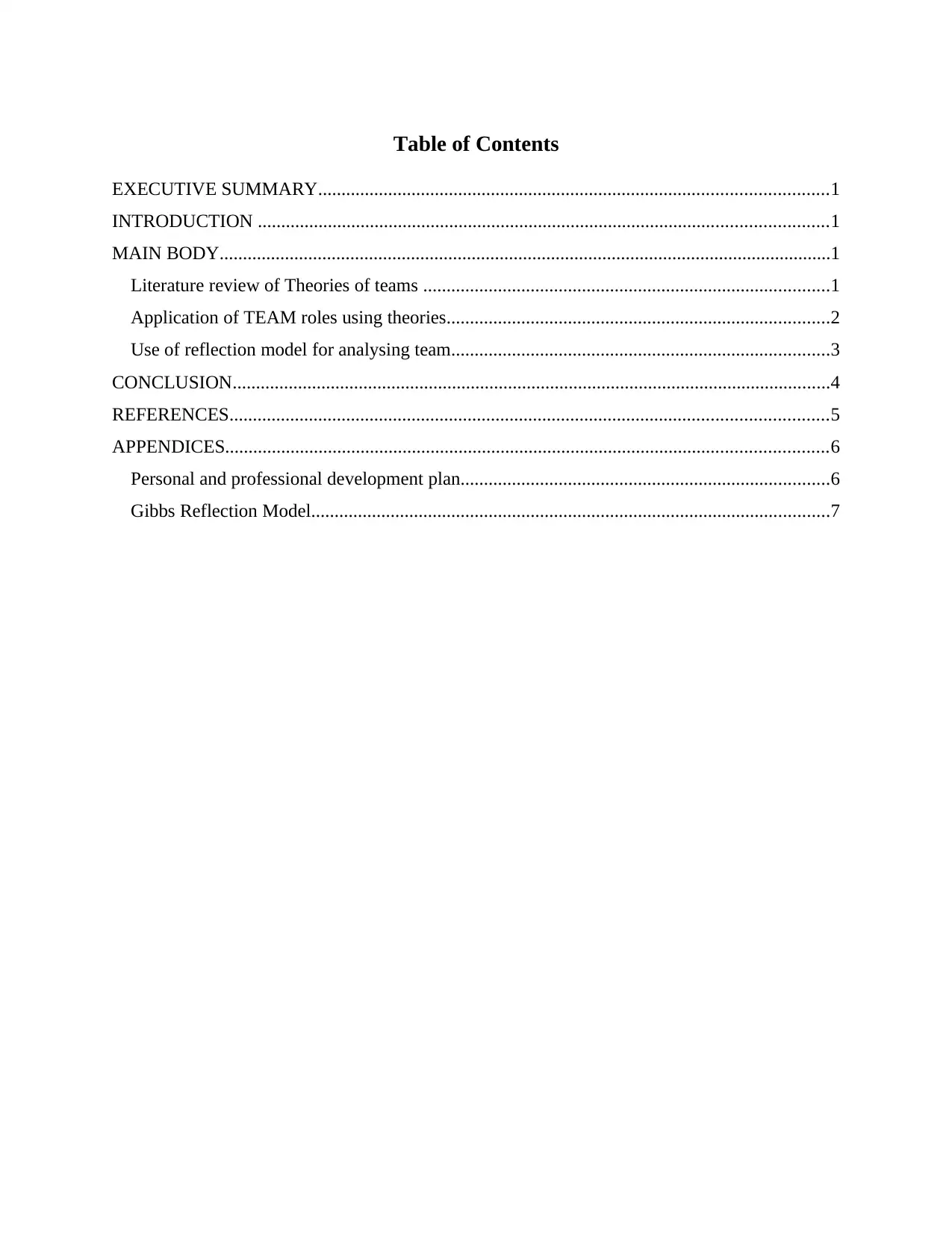
Table of Contents
EXECUTIVE SUMMARY.............................................................................................................1
INTRODUCTION ..........................................................................................................................1
MAIN BODY...................................................................................................................................1
Literature review of Theories of teams .......................................................................................1
Application of TEAM roles using theories..................................................................................2
Use of reflection model for analysing team.................................................................................3
CONCLUSION................................................................................................................................4
REFERENCES................................................................................................................................5
APPENDICES.................................................................................................................................6
Personal and professional development plan...............................................................................6
Gibbs Reflection Model...............................................................................................................7
EXECUTIVE SUMMARY.............................................................................................................1
INTRODUCTION ..........................................................................................................................1
MAIN BODY...................................................................................................................................1
Literature review of Theories of teams .......................................................................................1
Application of TEAM roles using theories..................................................................................2
Use of reflection model for analysing team.................................................................................3
CONCLUSION................................................................................................................................4
REFERENCES................................................................................................................................5
APPENDICES.................................................................................................................................6
Personal and professional development plan...............................................................................6
Gibbs Reflection Model...............................................................................................................7
⊘ This is a preview!⊘
Do you want full access?
Subscribe today to unlock all pages.

Trusted by 1+ million students worldwide

Paraphrase This Document
Need a fresh take? Get an instant paraphrase of this document with our AI Paraphraser
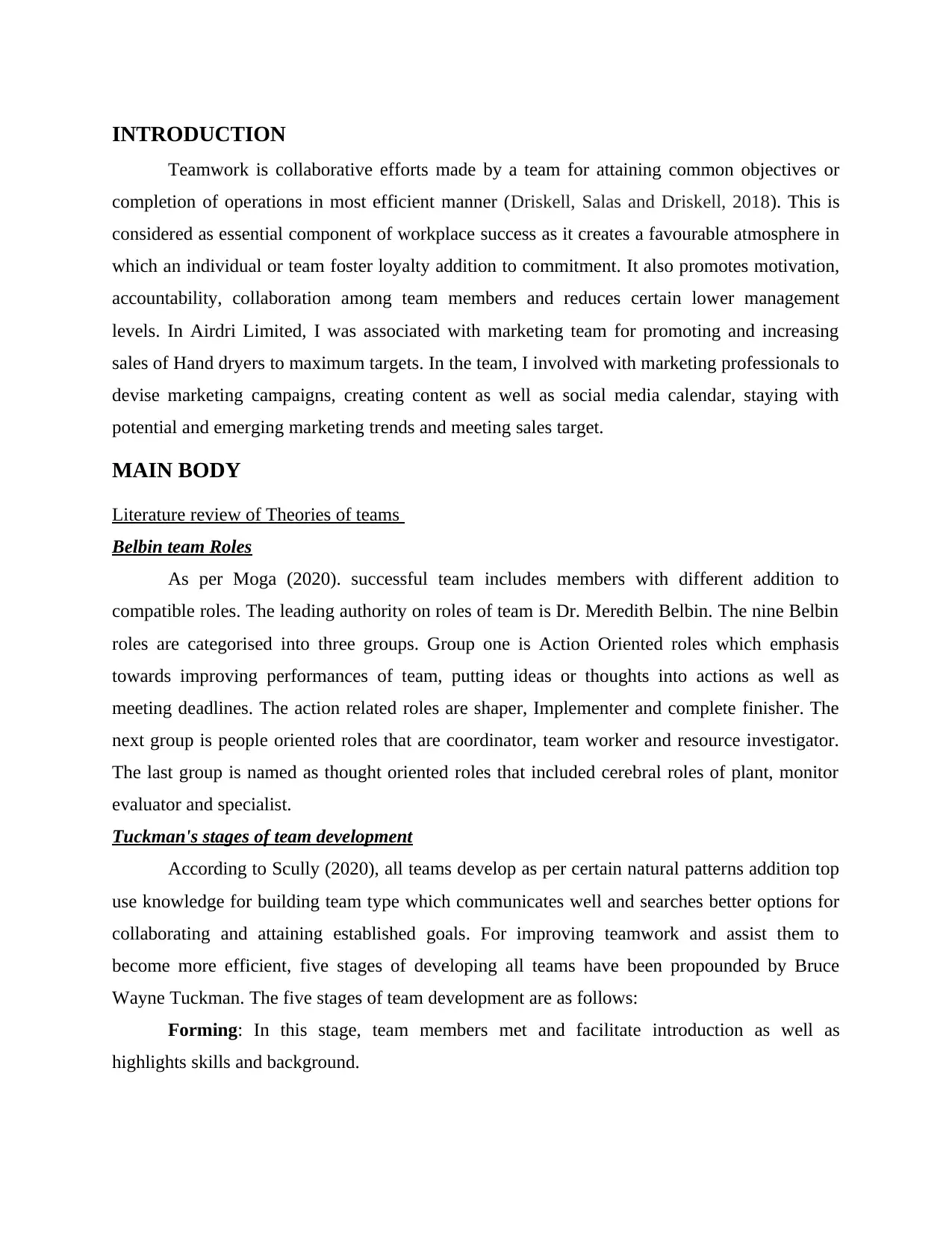
INTRODUCTION
Teamwork is collaborative efforts made by a team for attaining common objectives or
completion of operations in most efficient manner (Driskell, Salas and Driskell, 2018). This is
considered as essential component of workplace success as it creates a favourable atmosphere in
which an individual or team foster loyalty addition to commitment. It also promotes motivation,
accountability, collaboration among team members and reduces certain lower management
levels. In Airdri Limited, I was associated with marketing team for promoting and increasing
sales of Hand dryers to maximum targets. In the team, I involved with marketing professionals to
devise marketing campaigns, creating content as well as social media calendar, staying with
potential and emerging marketing trends and meeting sales target.
MAIN BODY
Literature review of Theories of teams
Belbin team Roles
As per Moga (2020). successful team includes members with different addition to
compatible roles. The leading authority on roles of team is Dr. Meredith Belbin. The nine Belbin
roles are categorised into three groups. Group one is Action Oriented roles which emphasis
towards improving performances of team, putting ideas or thoughts into actions as well as
meeting deadlines. The action related roles are shaper, Implementer and complete finisher. The
next group is people oriented roles that are coordinator, team worker and resource investigator.
The last group is named as thought oriented roles that included cerebral roles of plant, monitor
evaluator and specialist.
Tuckman's stages of team development
According to Scully (2020), all teams develop as per certain natural patterns addition top
use knowledge for building team type which communicates well and searches better options for
collaborating and attaining established goals. For improving teamwork and assist them to
become more efficient, five stages of developing all teams have been propounded by Bruce
Wayne Tuckman. The five stages of team development are as follows:
Forming: In this stage, team members met and facilitate introduction as well as
highlights skills and background.
Teamwork is collaborative efforts made by a team for attaining common objectives or
completion of operations in most efficient manner (Driskell, Salas and Driskell, 2018). This is
considered as essential component of workplace success as it creates a favourable atmosphere in
which an individual or team foster loyalty addition to commitment. It also promotes motivation,
accountability, collaboration among team members and reduces certain lower management
levels. In Airdri Limited, I was associated with marketing team for promoting and increasing
sales of Hand dryers to maximum targets. In the team, I involved with marketing professionals to
devise marketing campaigns, creating content as well as social media calendar, staying with
potential and emerging marketing trends and meeting sales target.
MAIN BODY
Literature review of Theories of teams
Belbin team Roles
As per Moga (2020). successful team includes members with different addition to
compatible roles. The leading authority on roles of team is Dr. Meredith Belbin. The nine Belbin
roles are categorised into three groups. Group one is Action Oriented roles which emphasis
towards improving performances of team, putting ideas or thoughts into actions as well as
meeting deadlines. The action related roles are shaper, Implementer and complete finisher. The
next group is people oriented roles that are coordinator, team worker and resource investigator.
The last group is named as thought oriented roles that included cerebral roles of plant, monitor
evaluator and specialist.
Tuckman's stages of team development
According to Scully (2020), all teams develop as per certain natural patterns addition top
use knowledge for building team type which communicates well and searches better options for
collaborating and attaining established goals. For improving teamwork and assist them to
become more efficient, five stages of developing all teams have been propounded by Bruce
Wayne Tuckman. The five stages of team development are as follows:
Forming: In this stage, team members met and facilitate introduction as well as
highlights skills and background.
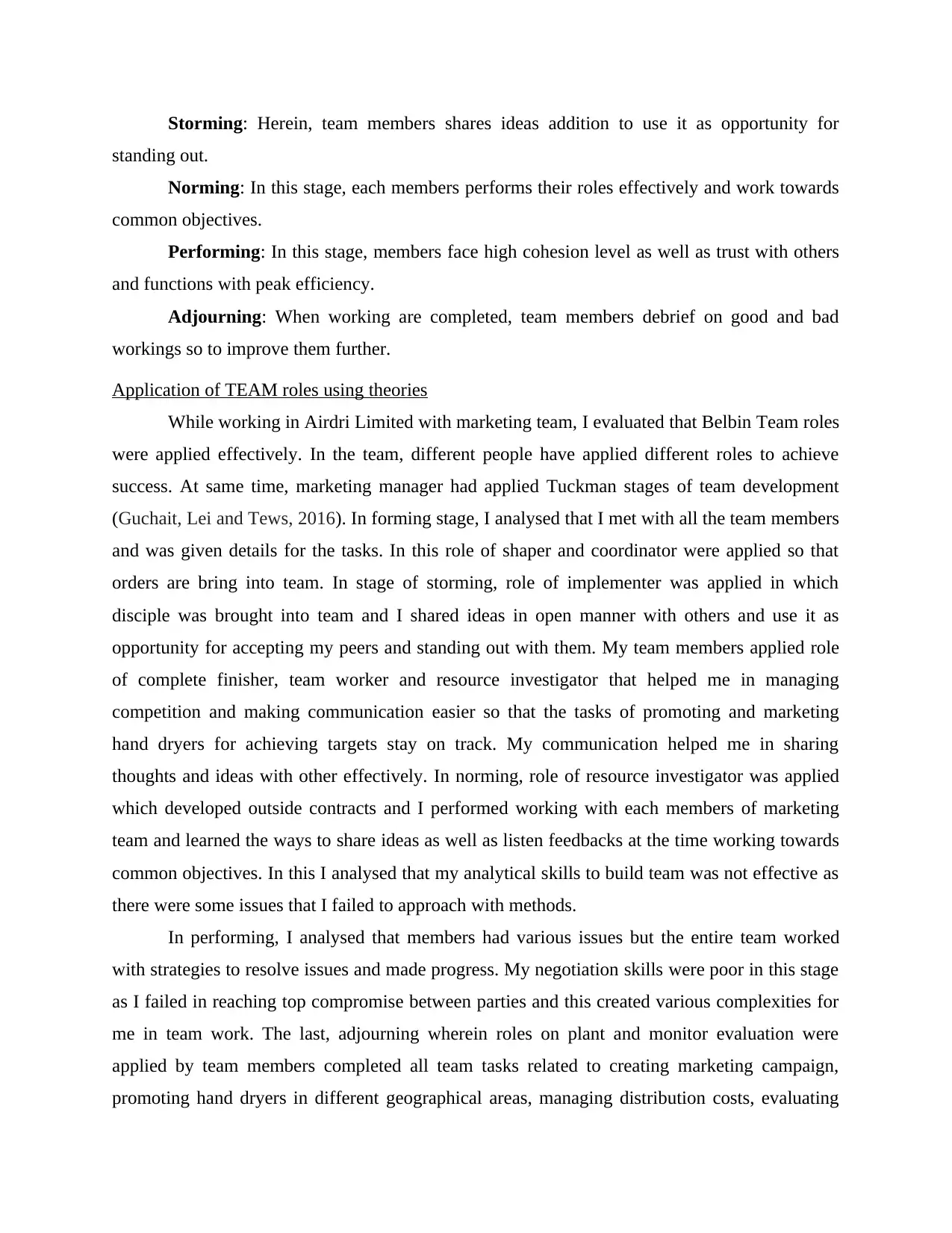
Storming: Herein, team members shares ideas addition to use it as opportunity for
standing out.
Norming: In this stage, each members performs their roles effectively and work towards
common objectives.
Performing: In this stage, members face high cohesion level as well as trust with others
and functions with peak efficiency.
Adjourning: When working are completed, team members debrief on good and bad
workings so to improve them further.
Application of TEAM roles using theories
While working in Airdri Limited with marketing team, I evaluated that Belbin Team roles
were applied effectively. In the team, different people have applied different roles to achieve
success. At same time, marketing manager had applied Tuckman stages of team development
(Guchait, Lei and Tews, 2016). In forming stage, I analysed that I met with all the team members
and was given details for the tasks. In this role of shaper and coordinator were applied so that
orders are bring into team. In stage of storming, role of implementer was applied in which
disciple was brought into team and I shared ideas in open manner with others and use it as
opportunity for accepting my peers and standing out with them. My team members applied role
of complete finisher, team worker and resource investigator that helped me in managing
competition and making communication easier so that the tasks of promoting and marketing
hand dryers for achieving targets stay on track. My communication helped me in sharing
thoughts and ideas with other effectively. In norming, role of resource investigator was applied
which developed outside contracts and I performed working with each members of marketing
team and learned the ways to share ideas as well as listen feedbacks at the time working towards
common objectives. In this I analysed that my analytical skills to build team was not effective as
there were some issues that I failed to approach with methods.
In performing, I analysed that members had various issues but the entire team worked
with strategies to resolve issues and made progress. My negotiation skills were poor in this stage
as I failed in reaching top compromise between parties and this created various complexities for
me in team work. The last, adjourning wherein roles on plant and monitor evaluation were
applied by team members completed all team tasks related to creating marketing campaign,
promoting hand dryers in different geographical areas, managing distribution costs, evaluating
standing out.
Norming: In this stage, each members performs their roles effectively and work towards
common objectives.
Performing: In this stage, members face high cohesion level as well as trust with others
and functions with peak efficiency.
Adjourning: When working are completed, team members debrief on good and bad
workings so to improve them further.
Application of TEAM roles using theories
While working in Airdri Limited with marketing team, I evaluated that Belbin Team roles
were applied effectively. In the team, different people have applied different roles to achieve
success. At same time, marketing manager had applied Tuckman stages of team development
(Guchait, Lei and Tews, 2016). In forming stage, I analysed that I met with all the team members
and was given details for the tasks. In this role of shaper and coordinator were applied so that
orders are bring into team. In stage of storming, role of implementer was applied in which
disciple was brought into team and I shared ideas in open manner with others and use it as
opportunity for accepting my peers and standing out with them. My team members applied role
of complete finisher, team worker and resource investigator that helped me in managing
competition and making communication easier so that the tasks of promoting and marketing
hand dryers for achieving targets stay on track. My communication helped me in sharing
thoughts and ideas with other effectively. In norming, role of resource investigator was applied
which developed outside contracts and I performed working with each members of marketing
team and learned the ways to share ideas as well as listen feedbacks at the time working towards
common objectives. In this I analysed that my analytical skills to build team was not effective as
there were some issues that I failed to approach with methods.
In performing, I analysed that members had various issues but the entire team worked
with strategies to resolve issues and made progress. My negotiation skills were poor in this stage
as I failed in reaching top compromise between parties and this created various complexities for
me in team work. The last, adjourning wherein roles on plant and monitor evaluation were
applied by team members completed all team tasks related to creating marketing campaign,
promoting hand dryers in different geographical areas, managing distribution costs, evaluating
⊘ This is a preview!⊘
Do you want full access?
Subscribe today to unlock all pages.

Trusted by 1+ million students worldwide
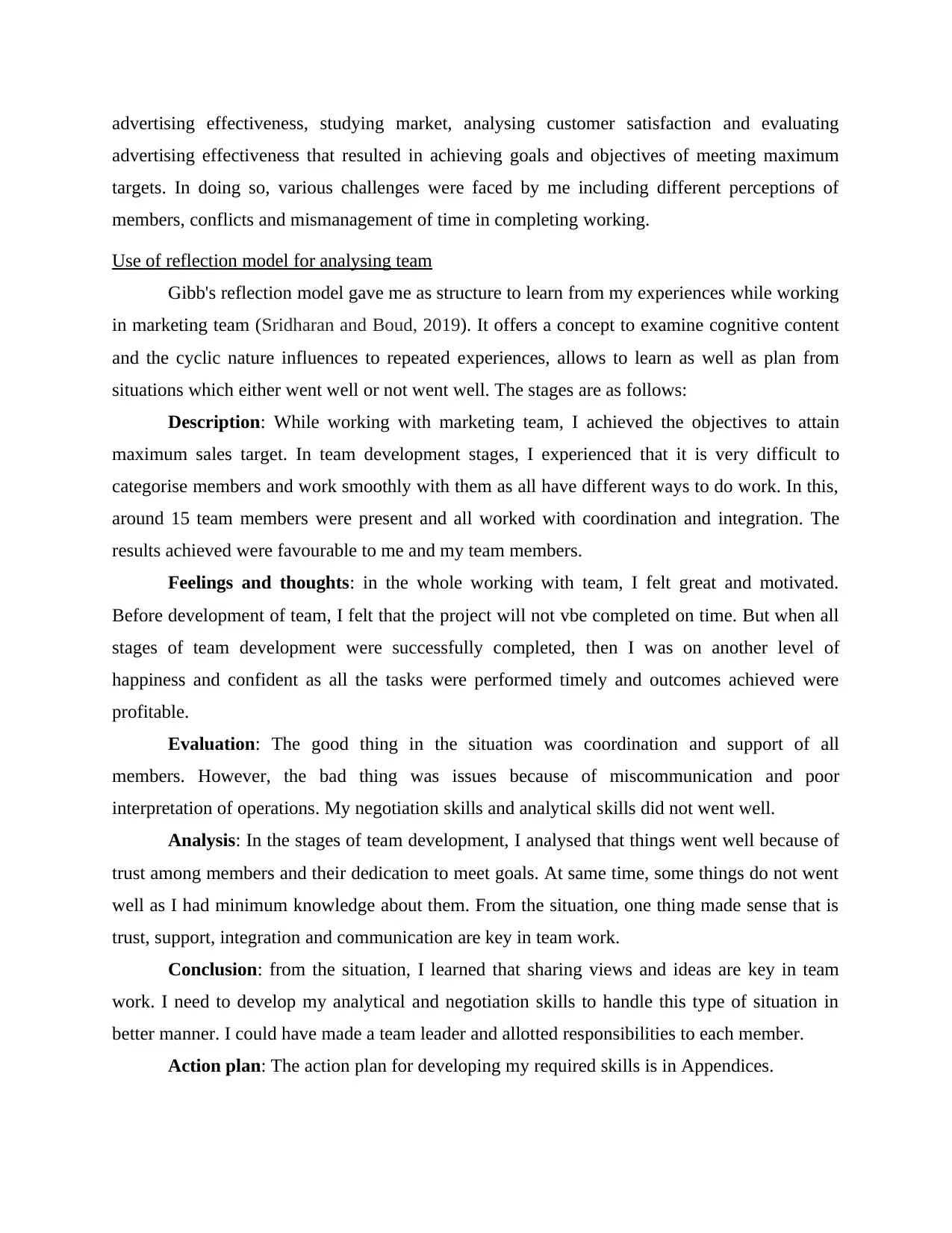
advertising effectiveness, studying market, analysing customer satisfaction and evaluating
advertising effectiveness that resulted in achieving goals and objectives of meeting maximum
targets. In doing so, various challenges were faced by me including different perceptions of
members, conflicts and mismanagement of time in completing working.
Use of reflection model for analysing team
Gibb's reflection model gave me as structure to learn from my experiences while working
in marketing team (Sridharan and Boud, 2019). It offers a concept to examine cognitive content
and the cyclic nature influences to repeated experiences, allows to learn as well as plan from
situations which either went well or not went well. The stages are as follows:
Description: While working with marketing team, I achieved the objectives to attain
maximum sales target. In team development stages, I experienced that it is very difficult to
categorise members and work smoothly with them as all have different ways to do work. In this,
around 15 team members were present and all worked with coordination and integration. The
results achieved were favourable to me and my team members.
Feelings and thoughts: in the whole working with team, I felt great and motivated.
Before development of team, I felt that the project will not vbe completed on time. But when all
stages of team development were successfully completed, then I was on another level of
happiness and confident as all the tasks were performed timely and outcomes achieved were
profitable.
Evaluation: The good thing in the situation was coordination and support of all
members. However, the bad thing was issues because of miscommunication and poor
interpretation of operations. My negotiation skills and analytical skills did not went well.
Analysis: In the stages of team development, I analysed that things went well because of
trust among members and their dedication to meet goals. At same time, some things do not went
well as I had minimum knowledge about them. From the situation, one thing made sense that is
trust, support, integration and communication are key in team work.
Conclusion: from the situation, I learned that sharing views and ideas are key in team
work. I need to develop my analytical and negotiation skills to handle this type of situation in
better manner. I could have made a team leader and allotted responsibilities to each member.
Action plan: The action plan for developing my required skills is in Appendices.
advertising effectiveness that resulted in achieving goals and objectives of meeting maximum
targets. In doing so, various challenges were faced by me including different perceptions of
members, conflicts and mismanagement of time in completing working.
Use of reflection model for analysing team
Gibb's reflection model gave me as structure to learn from my experiences while working
in marketing team (Sridharan and Boud, 2019). It offers a concept to examine cognitive content
and the cyclic nature influences to repeated experiences, allows to learn as well as plan from
situations which either went well or not went well. The stages are as follows:
Description: While working with marketing team, I achieved the objectives to attain
maximum sales target. In team development stages, I experienced that it is very difficult to
categorise members and work smoothly with them as all have different ways to do work. In this,
around 15 team members were present and all worked with coordination and integration. The
results achieved were favourable to me and my team members.
Feelings and thoughts: in the whole working with team, I felt great and motivated.
Before development of team, I felt that the project will not vbe completed on time. But when all
stages of team development were successfully completed, then I was on another level of
happiness and confident as all the tasks were performed timely and outcomes achieved were
profitable.
Evaluation: The good thing in the situation was coordination and support of all
members. However, the bad thing was issues because of miscommunication and poor
interpretation of operations. My negotiation skills and analytical skills did not went well.
Analysis: In the stages of team development, I analysed that things went well because of
trust among members and their dedication to meet goals. At same time, some things do not went
well as I had minimum knowledge about them. From the situation, one thing made sense that is
trust, support, integration and communication are key in team work.
Conclusion: from the situation, I learned that sharing views and ideas are key in team
work. I need to develop my analytical and negotiation skills to handle this type of situation in
better manner. I could have made a team leader and allotted responsibilities to each member.
Action plan: The action plan for developing my required skills is in Appendices.
Paraphrase This Document
Need a fresh take? Get an instant paraphrase of this document with our AI Paraphraser
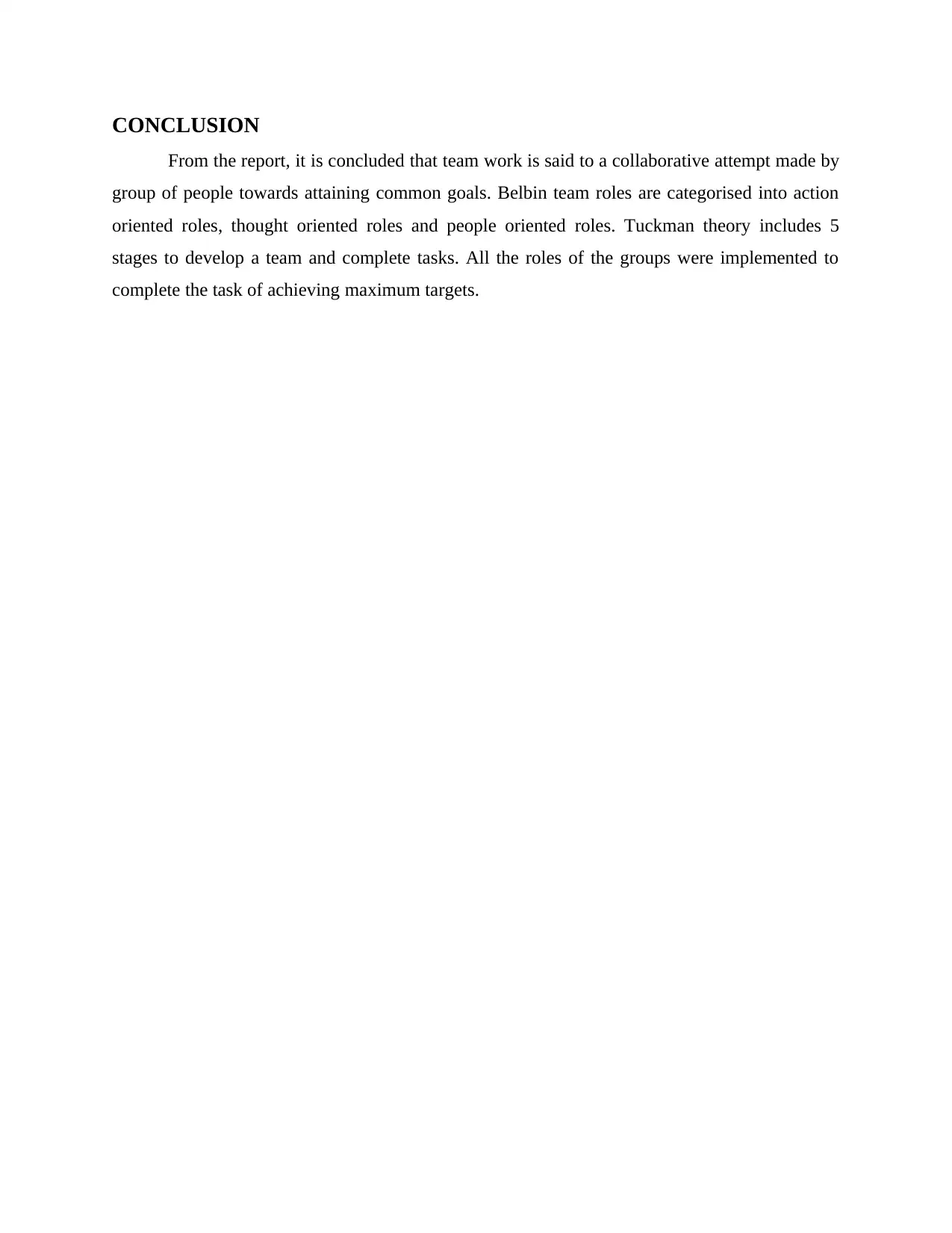
CONCLUSION
From the report, it is concluded that team work is said to a collaborative attempt made by
group of people towards attaining common goals. Belbin team roles are categorised into action
oriented roles, thought oriented roles and people oriented roles. Tuckman theory includes 5
stages to develop a team and complete tasks. All the roles of the groups were implemented to
complete the task of achieving maximum targets.
From the report, it is concluded that team work is said to a collaborative attempt made by
group of people towards attaining common goals. Belbin team roles are categorised into action
oriented roles, thought oriented roles and people oriented roles. Tuckman theory includes 5
stages to develop a team and complete tasks. All the roles of the groups were implemented to
complete the task of achieving maximum targets.
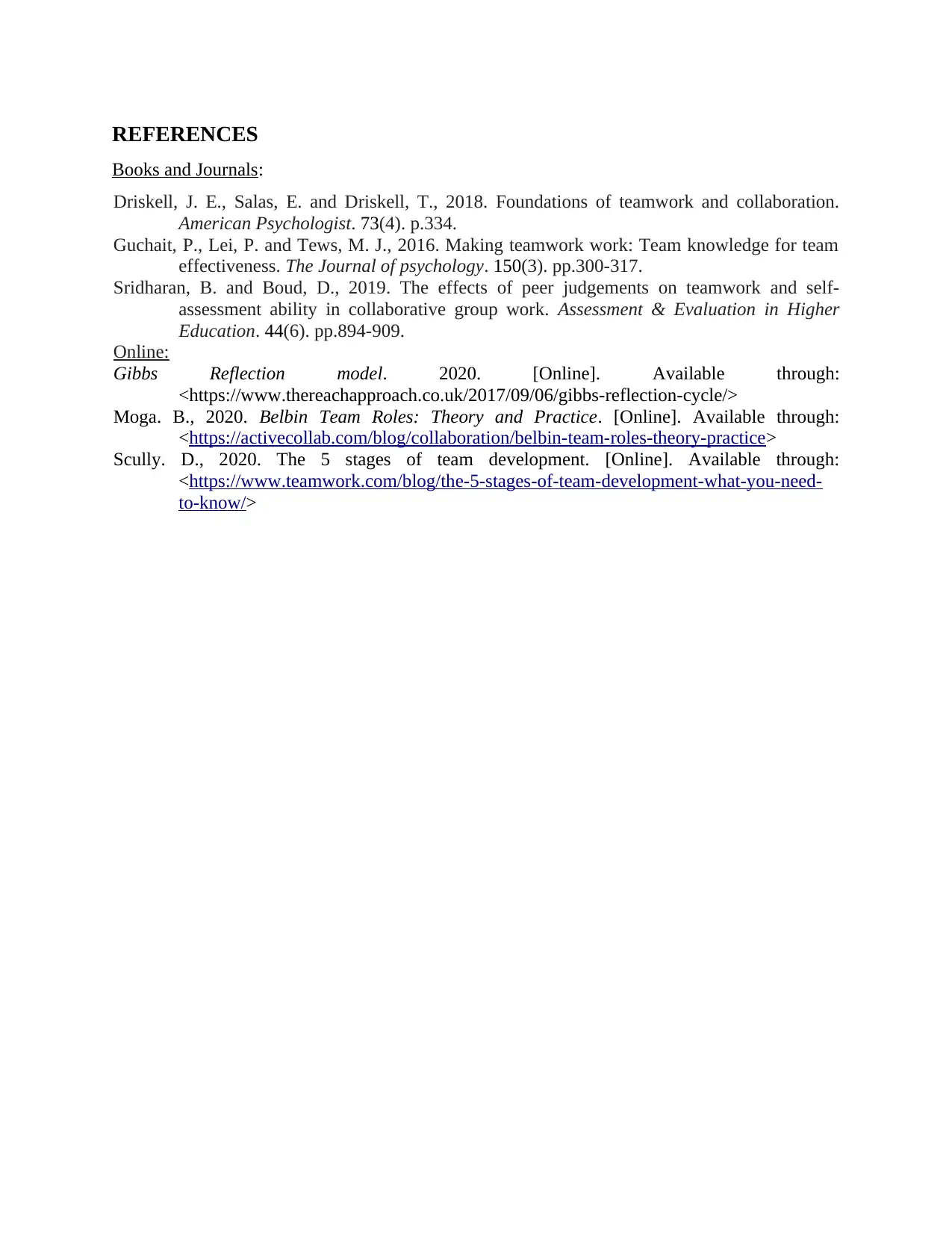
REFERENCES
Books and Journals:
Driskell, J. E., Salas, E. and Driskell, T., 2018. Foundations of teamwork and collaboration.
American Psychologist. 73(4). p.334.
Guchait, P., Lei, P. and Tews, M. J., 2016. Making teamwork work: Team knowledge for team
effectiveness. The Journal of psychology. 150(3). pp.300-317.
Sridharan, B. and Boud, D., 2019. The effects of peer judgements on teamwork and self-
assessment ability in collaborative group work. Assessment & Evaluation in Higher
Education. 44(6). pp.894-909.
Online:
Gibbs Reflection model. 2020. [Online]. Available through:
<https://www.thereachapproach.co.uk/2017/09/06/gibbs-reflection-cycle/>
Moga. B., 2020. Belbin Team Roles: Theory and Practice. [Online]. Available through:
<https://activecollab.com/blog/collaboration/belbin-team-roles-theory-practice>
Scully. D., 2020. The 5 stages of team development. [Online]. Available through:
<https://www.teamwork.com/blog/the-5-stages-of-team-development-what-you-need-
to-know/>
Books and Journals:
Driskell, J. E., Salas, E. and Driskell, T., 2018. Foundations of teamwork and collaboration.
American Psychologist. 73(4). p.334.
Guchait, P., Lei, P. and Tews, M. J., 2016. Making teamwork work: Team knowledge for team
effectiveness. The Journal of psychology. 150(3). pp.300-317.
Sridharan, B. and Boud, D., 2019. The effects of peer judgements on teamwork and self-
assessment ability in collaborative group work. Assessment & Evaluation in Higher
Education. 44(6). pp.894-909.
Online:
Gibbs Reflection model. 2020. [Online]. Available through:
<https://www.thereachapproach.co.uk/2017/09/06/gibbs-reflection-cycle/>
Moga. B., 2020. Belbin Team Roles: Theory and Practice. [Online]. Available through:
<https://activecollab.com/blog/collaboration/belbin-team-roles-theory-practice>
Scully. D., 2020. The 5 stages of team development. [Online]. Available through:
<https://www.teamwork.com/blog/the-5-stages-of-team-development-what-you-need-
to-know/>
⊘ This is a preview!⊘
Do you want full access?
Subscribe today to unlock all pages.

Trusted by 1+ million students worldwide
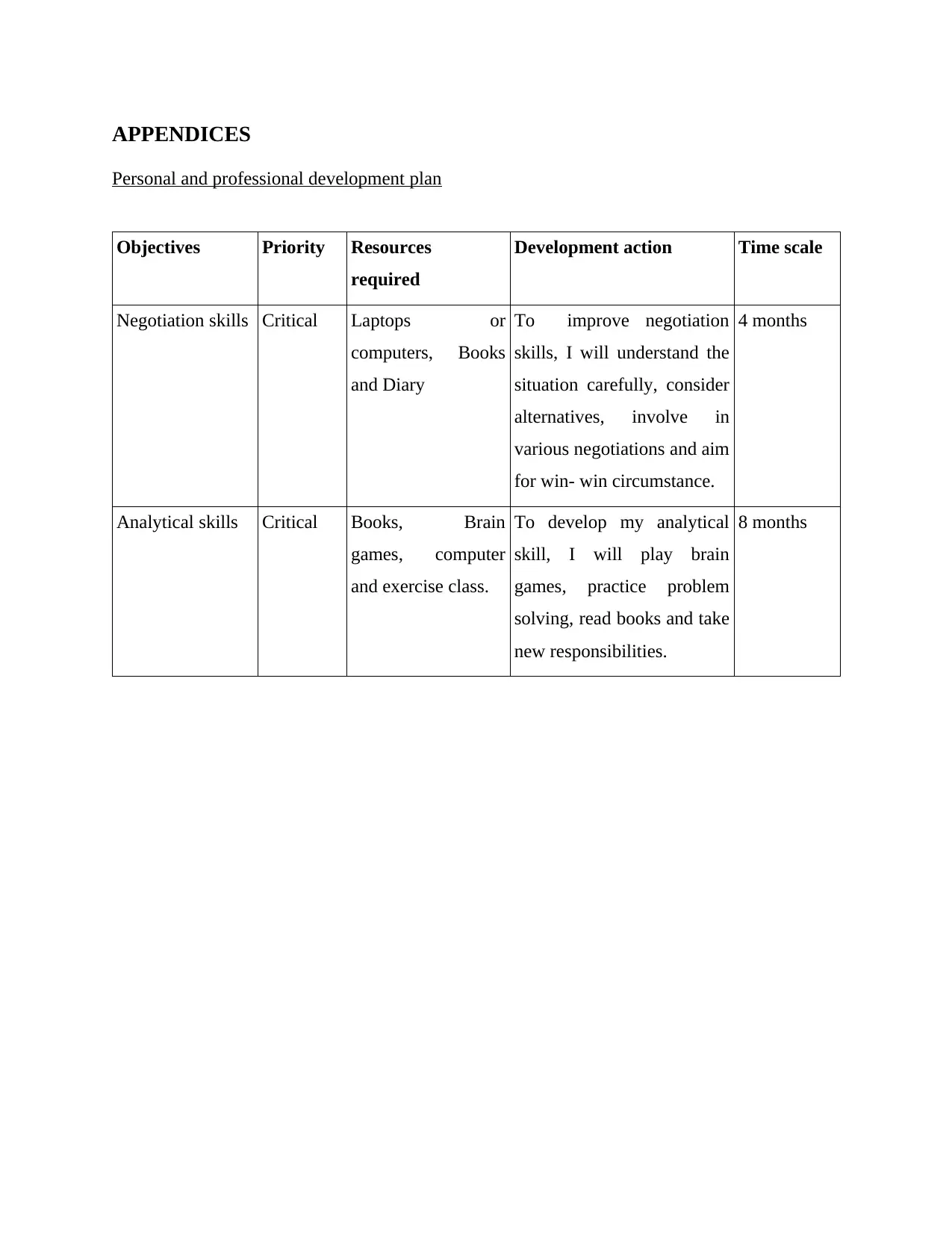
APPENDICES
Personal and professional development plan
Objectives Priority Resources
required
Development action Time scale
Negotiation skills Critical Laptops or
computers, Books
and Diary
To improve negotiation
skills, I will understand the
situation carefully, consider
alternatives, involve in
various negotiations and aim
for win- win circumstance.
4 months
Analytical skills Critical Books, Brain
games, computer
and exercise class.
To develop my analytical
skill, I will play brain
games, practice problem
solving, read books and take
new responsibilities.
8 months
Personal and professional development plan
Objectives Priority Resources
required
Development action Time scale
Negotiation skills Critical Laptops or
computers, Books
and Diary
To improve negotiation
skills, I will understand the
situation carefully, consider
alternatives, involve in
various negotiations and aim
for win- win circumstance.
4 months
Analytical skills Critical Books, Brain
games, computer
and exercise class.
To develop my analytical
skill, I will play brain
games, practice problem
solving, read books and take
new responsibilities.
8 months
Paraphrase This Document
Need a fresh take? Get an instant paraphrase of this document with our AI Paraphraser
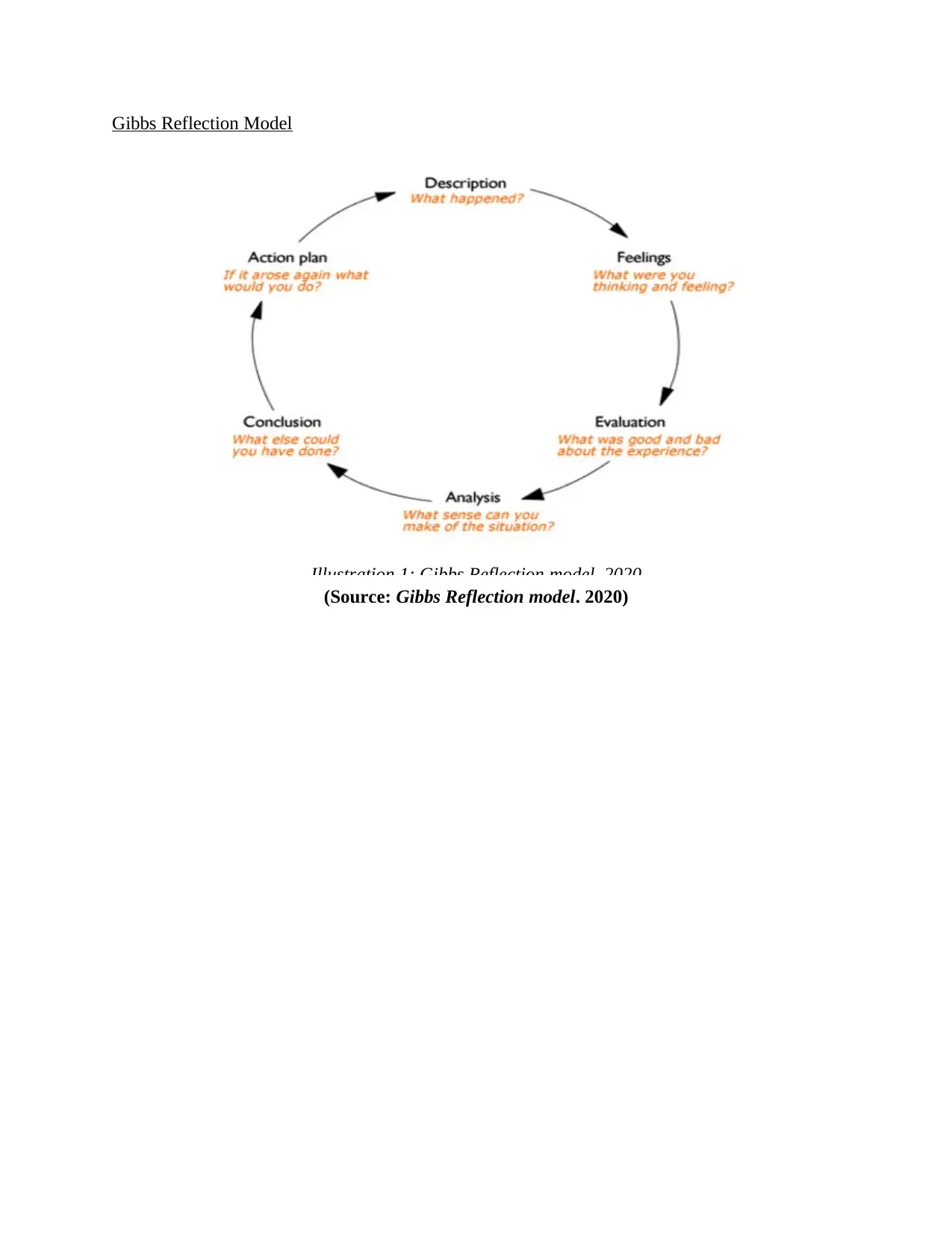
Gibbs Reflection Model
Illustration 1: Gibbs Reflection model. 2020
(Source: Gibbs Reflection model. 2020)
Illustration 1: Gibbs Reflection model. 2020
(Source: Gibbs Reflection model. 2020)
1 out of 11
Related Documents
Your All-in-One AI-Powered Toolkit for Academic Success.
+13062052269
info@desklib.com
Available 24*7 on WhatsApp / Email
![[object Object]](/_next/static/media/star-bottom.7253800d.svg)
Unlock your academic potential
Copyright © 2020–2026 A2Z Services. All Rights Reserved. Developed and managed by ZUCOL.




